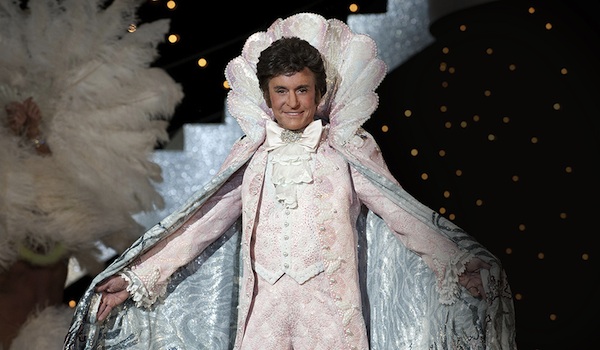Behind the Candelabra Review
For his feature film swan song, director Steven Soderbergh has elected to tell a sordid tale about sex, drugs, plastic surgery, possible incest, and shattered dreams. Behind the Candelabra also happens to be a biopic chronicling the latter years of music legend Liberace. Dubbed (by himself and those around him) “Mr. Showmanship,” Liberace lived a life that’s depicted here with all the bright lights and extravagance you might expect. And though these qualities are far from Soderbergh’s calling cards (superficially, the story seems more suited for Baz Luhrmann than the man who brought us Out of Sight, Bubble, and Contagion), the meat of Liberace’s life fits Soderbergh like a glove.
One of the more fascinating aspects of Behind the Candelabra is its point of view. The film is as much about Scott Thorson (Matt Damon) as it is Liberace, and everything we learn about the famous piano player is filtered through the eyes of his corn-fed confidant. Scott meets “Lee” (Michael Douglas), a world-famous piano player and the ultimate showman, backstage following a Las Vegas show. It’s the former’s first time in the City of Sin (he lives outside Los Angeles with his foster parents), while one gets the sense this is far from the first time the latter has fallen for a simple country boy in his magnificent dressing room.
Scott, it turns out, loves and works with animals, and when Lee needs someone to care for his dogs, he hires his new friend Scott. The position, however, requires more, um, flexibility than that. Lee wants Scott to be everywhere and do everything with him. A genuine love develops between them as Scott is simply entranced by the lifestyle—the furs, the jewels, the cars, the palatial house. It isn’t long, however, before Lee starts asking a lot of his young friend, like facial reconstructive surgery so Scott can look just like him. Lee even talks about formally adopting Scott, who takes to drugs for just a semblance of freedom, no matter how fleeting and ultimately ruinous that freedom is.
Like many of Soderbergh’s films (including his two most recent, Magic Mike and Side Effects), Behind the Candelabra deals matter-of-factly with the dissolution of one’s hopes and dreams. Liberace’s fatal flaws are his promiscuity and, more importantly, his lack of humility. Scott is destructively naive and, more obviously, a drug addict. For half the film’s running time, we’re swept up in a whirlwind romance that, if you asked the two men involved, is infallible. Through Soderbergh’s camera, however, we’re afforded the chance early on and throughout the film to see the seeds of discontent as they’re sown, and after a few key conversations, decisions, and requests, it’s all downhill for Scott and Lee. In that respect, Behind the Candelabra probably isn’t as fun a watch as you might expect, but damn if it isn’t effective in developing character and conflict, as well as making you feel surprisingly involved in a romance that, for most, is completely foreign.
And while Soderbergh’s achievement is undeniable, Behind the Candelabra is nothing if not a showcase for Michael Douglas and Matt Damon. Douglas’ is, of course, the showier of the two roles. His voice, mannerisms are very affected, but there’s much more to it than that. His Liberace is rather slimy. He’ll give you the world, but only for something in return. And if what he’s asking (like undergoing facial reconstruction to look just like him) is too much, he can slyly charm you into doing it anyway. There are shades of a horror movie villain in the character (he seems to enjoy trapping young men in a life that quickly falls out of their control), and Douglas simply nails it.
Damon, too, nails the character of Scott in a way that might not present itself immediately. He isn’t asked to do much for the “falling in love” portion of the film, but as things turn sour with Scott and Lee, Damon shifts gears significantly. Suddenly, his Scott is dynamic. He gains some agency, and his manic shifts in mood are something to behold. Damon’s been a consistently reliable performer for years now, but not since Soderbergh’s The Informant! has he been this good.
There’s one last pro to Behind the Candelabra that’s more wrapped up in the big-picture context of this as a project and shouldn’t be glossed over. You can’t help but watch this film, especially the last few scenes as this whirlwind romance plays itself out, and not feel a pang of melancholy over this being Soderbergh’s final motion picture. Made for television as it might be, this is pretty brilliant stuff, and, like Side Effects from earlier this year, it’s a worthy send-off for one of his generation’s best.

















3 Responses to Behind the Candelabra Review